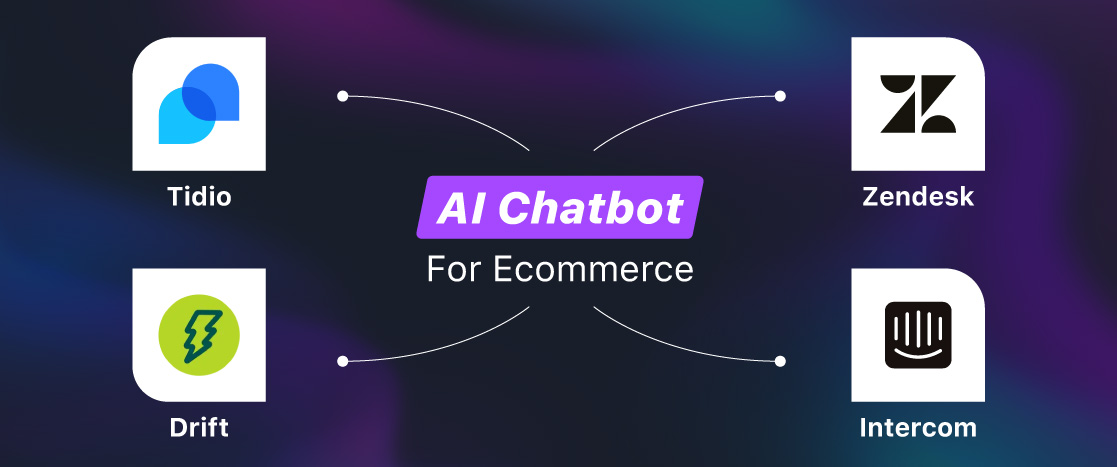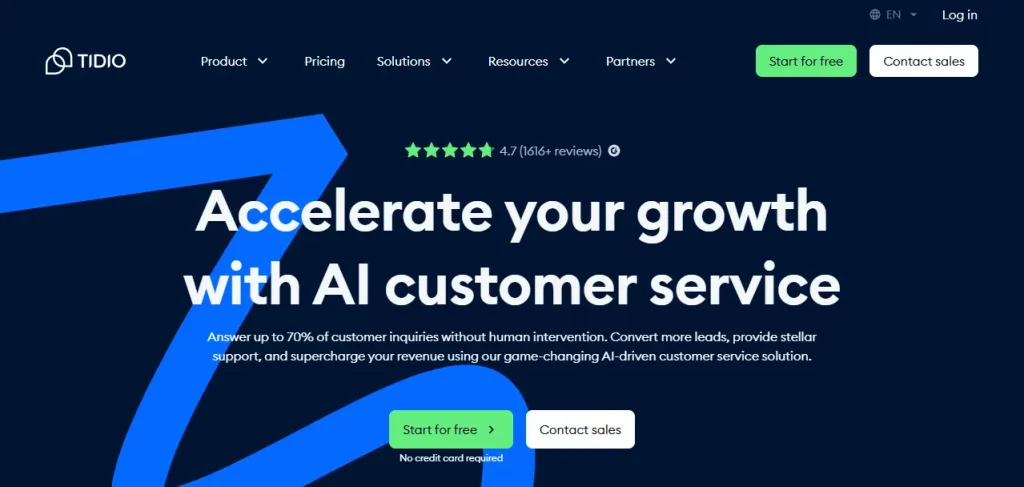
The Best Examples AI Chatbot for E-Commerce: The Way to Success
Over 2 billion people make purchases online. Although e-commerce enterprises have more opportunities than ever to expand, meeting customer service demands might be challenging due to rising demand. Poor customer service and cart abandonment are only two more problems that exacerbate the situation.
AI ecommerce chatbots solve these problems by optimizing sales, responding to consumer inquiries, and offering instant customer care.
These chatbots mimic human-like dialogues to aid users with product discovery, question answering, recommendation making, and even checkout procedures. Ecommerce AI chatbots usually offer round-the-clock assistance to improve the buying experience and are incorporated into your website, social media accounts, or messaging applications. Additionally, a robust ecommerce hosting solution ensures seamless chatbot functionality, fast response times, and a reliable user experience without downtime.
Let’s examine top AI chatbots for ecommerce, their operation, and how to integrate them with your store.

The Role of AI Chatbots in Enhancing Customer Experience
AI chatbots are essential for improving the customer experience because they offer 24/7, immediate, individualized assistance. They make it easy for clients to identify things, get answers to their questions, and even finish purchases. By providing prompt resolutions and personalized recommendations, AI chatbots help eCommerce firms increase customer satisfaction, foster loyalty, and expedite the buying experience.
- 24/7 Customer Support: AI chatbots in eCommerce provide 24/7 support, ensuring instant responses, enhanced customer satisfaction, and efficient handling of multiple inquiries.
- Personalized Shopping Experience: AI chatbots enhance eCommerce by delivering personalized shopping experiences, boosting sales, and fostering customer loyalty through tailored recommendations.
- Streamlining the Checkout Process: AI chatbots reduce cart abandonment by offering real-time assistance, answering queries, providing discounts, and streamlining the checkout process for a smoother shopping experience.
| S. No. | Names | Pricing | Best For | Free Version |
| 1 | Tidio | Starts at $29/month | Small to medium businesses (SMBs) | (Limited features) |
| 2 | Drift | Custom pricing (starts around $2,500/month for advanced AI) | Enterprise-level eCommerce and B2B businesses | (Only a demo) |
| 3 | Zendesk | Starts at $19/month (Suite Team) | Businesses needing advanced customer support | (Limited AI chatbot features) |
| 4 | Intercom | Starts at $39/month (Starter plan) | Growing and enterprise businesses | (14-days trial) |
Top AI Chatbot Providers for eCommerce
When it comes to choosing the best AI chatbot for ecommerce customer service, businesses are spoiled for choice. Several AI chatbot platforms stand out in 2025, each offering unique features and benefits tailored to different business needs.
Tidio
Tidio is a popular AI chatbot platform known for its user-friendly interface and seamless integration capabilities, making it an ideal choice for small to medium-sized eCommerce businesses. This platform excels in providing essential features like Natural Language Processing (NLP), which allows chatbots to understand and respond to customer inquiries conversationally. Tidio also supports omnichannel integration, enabling businesses to manage customer interactions across multiple platforms, including websites, social media, and email. Additionally, Tidio offers automated customer service, helping businesses efficiently handle routine inquiries and tasks, thereby freeing up human resources for more complex customer interactions.

Drift
Drift is a leading AI chatbot platform designed to enhance conversational AI for eCommerce, particularly in the areas of lead generation and customer engagement. Drift’s platform is optimized for driving sales and marketing efforts, making it a top choice for businesses focused on these areas. The platform’s chatbots are equipped with advanced features that enable them to engage with potential customers proactively, guiding them through the sales funnel and converting leads into paying customers. Drift also integrates seamlessly with various CRM and marketing automation tools, allowing businesses to streamline their sales processes and improve overall efficiency.

Zendesk
Zendesk is renowned for its comprehensive customer support solutions, and its AI chatbot platform is a powerful extension of its offerings. This platform is designed to handle a wide range of customer inquiries, providing businesses with robust tools to manage customer interactions effectively. Zendesk’s AI chatbots integrate seamlessly with the company’s other customer support products, creating a unified platform that enhances the overall customer service experience. Key features include automated ticketing, response management, and data-driven insights, allowing businesses to deliver timely and accurate support while also gaining valuable insights into customer behavior and needs.

Intercom
Intercom is a versatile AI chatbot platform that combines chatbots with live chat and email marketing, offering a comprehensive solution for eCommerce businesses looking to enhance customer communication. Intercom’s platform is designed to facilitate real-time customer interactions, helping businesses provide personalized support and engage with customers at every stage of their journey. The platform’s chatbots are highly customizable, allowing businesses to tailor interactions to their specific needs. Additionally, Intercom integrates with a wide range of third-party tools, including CRM and marketing platforms, making it easy for businesses to synchronize their customer communication efforts and improve overall customer satisfaction.

Key Features to Look for in an eCommerce AI Chatbot
When selecting an eCommerce AI chatbot, look for essential characteristics like multilingual support, natural language processing for human-like conversations, round-the-clock availability, and smooth connection with your website and social media accounts. Extra features like order monitoring, product recommendations, and analytics tools guarantee better customer service and excellent conversion rates for your store.
Natural Language Processing (NLP)
Natural Language Processing (NLP) is a crucial feature in any AI chatbot platform for eCommerce. NLP enables chatbots to understand and respond to customer inquiries in a conversational and human-like manner. This technology allows chatbots to interpret the nuances of language, including slang, typos, and context, making interactions more fluid and natural. For businesses looking to implement an ecommerce chatbot, choosing one with robust NLP capabilities is essential for delivering a seamless customer experience.
Omnichannel Integration
In today’s digital age, customers interact with brands across various platforms—websites, social media, mobile apps, and more. An effective ecommerce AI bot platform should offer omnichannel integration, allowing the chatbot to operate seamlessly across all these channels. This ensures that customers receive consistent support and messaging, regardless of where they choose to interact with the brand. Omnichannel strategies, powered by AI chatbots, are becoming a standard practice for leading eCommerce brands.
Multilingual Support
As eCommerce continues to expand globally, catering to a diverse audience has become more important than ever. An ecommerce AI chatbot with multilingual support can communicate with customers in their preferred language, breaking down language barriers and enhancing the shopping experience. Businesses that incorporate multilingual chatbots into their customer support AI chatbot platform for ecommerce are seeing significant improvements in customer satisfaction and engagement.
AI-Driven Analytics and Insights
One of the most powerful aspects of AI chatbots for eCommerce is their ability to collect and analyze customer data. These chatbots can track interactions, monitor purchasing patterns, and provide valuable insights that help businesses fine-tune their marketing strategies and product offerings. By leveraging AI-driven analytics, eCommerce businesses can make data-driven decisions that improve customer engagement and boost sales.

AI Chatbots and eCommerce Trends
With their sophisticated personalization, voice-activated buying, and smooth omnichannel support, AI chatbots are influencing eCommerce developments. Improved AI algorithms offer multilingual interactions, real-time support, and more intelligent product recommendations. Sales are increasing due to integration with social commerce and predictive analytics, which makes AI chatbots a crucial tool for maintaining competitiveness in the eCommerce market.
The Rise of Conversational Commerce
Conversational commerce is a growing trend in eCommerce, where businesses use AI chatbots to facilitate sales and customer interactions directly within messaging platforms. In 2025, the integration of chatbots with voice assistants and smart devices is set to take conversational AI for ecommerce to the next level. This trend is driven by the increasing demand for convenient, hands-free shopping experiences, where customers can make purchases, inquire about products, and receive support through simple voice commands.
AI Chatbots and the Future of Personalization
The future of personalization in eCommerce lies in advanced AI techniques. AI chatbots are at the forefront of this revolution, using predictive analysis to offer highly tailored shopping experiences. By analyzing vast amounts of customer data, these chatbots can anticipate customer needs, suggest relevant products, and even predict future buying behavior. This level of personalization is expected to become a standard feature in the best AI chatbots for eCommerce customer service.
The Role of AI Chatbots in Social Commerce
Social commerce, the practice of buying and selling directly through social media platforms, is another trend where AI chatbots are making a significant impact. AI-driven chatbots for ecommerce are increasingly being used on platforms like Facebook, Instagram, and WhatsApp to engage with customers, answer queries, and facilitate transactions. This trend is expected to grow as more businesses recognize the potential of combining social media with AI chatbots to reach a broader audience.

Conclusion
AI chatbots for eCommerce have come a long way, offering numerous benefits that enhance customer experience, streamline operations, and boost sales. From providing 24/7 support to delivering personalized shopping experiences, these chatbots are transforming the way businesses interact with customers. However, implementing AI chatbots comes with its challenges, such as balancing automation with human interaction and ensuring data privacy. Despite these challenges, the future of AI chatbots in eCommerce looks promising, with exciting innovations on the horizon.
For eCommerce businesses looking to stay competitive in 2025 and beyond, adopting an AI chatbot platform is a crucial step. When choosing a chatbot platform, consider key features such as NLP, omnichannel integration, and multilingual support. Additionally, focus on maintaining the balance between automation and human interaction, and prioritize data privacy and E commerce security. By leveraging the power of AI chatbots, eCommerce businesses can enhance customer engagement, drive sales, and secure a strong position in the market.
FAQs
Can chatbots be used for e-commerce?
Indeed, e-commerce can take advantage of chatbots. They can assist clients in finding goods, responding to inquiries, and assisting them with the purchasing procedure. Additionally, chatbots can enhance customer satisfaction and automate customer support.
Which AI is used in chatbots?
A computer software that mimics human communication with a user is called a chatbot. While not all chatbots have artificial intelligence (AI), contemporary chatbots are increasingly using conversational AI methods like natural language processing (NLP) to comprehend user inquiries and generate automated answers.
Which of the following is a benefit of using AI chatbots in e-commerce?
By offering round-the-clock assistance, responding to commonly asked questions, and assisting customers with the purchasing process, AI chatbots in e-commerce can improve customer service, which in turn can increase customer satisfaction and possibly increase sales. Based on customer data, they can also personalize recommendations and help with product selection.







